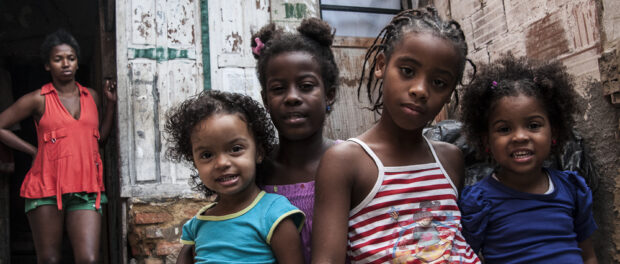
Houses numbered 48 and 50 on Passos da Pátria Street, in Niterói, share a special history of struggle for housing and dignity. Occupied for more than 20 years, 36 families now live inside their walls. In addition to the housing question, another feature of the Mama África occupation makes it unique. A group of ten women from the Foundation for Children and Teenagers (FIA) are directly responsible for the organization of community life. They try to instill a sense of stability that they themselves did not experience growing up. They were deprived of stable family lives and survived in shelters or orphanages until they were of age, at which point they were thrown into the streets without any support.
In 2009, the occupation gained the support of the International Homeless Front (FIST), through the lawyer André de Paula. In 2012, Mama África drew the attention of the Housing and Urbanization Studies and Projects Nucleus (Nephu) of the Federal Fluminense University (UFF), which bolstered the occupation’s cause by developing an infrastructure upgrading project in partnership with the community. The community is implementing diverse cultural projects including a community library, workshops, and bazaars, all of which attract regular participation from various social activists who come to support the activities that Mama África organizes.
Last November the community received their first legal victory providing definitive title to the families. The City government attempted to appeal the decision but lost twice. Residents now proceed confident in this definitive result and in the implementation of the upgrading plan.
The community develops diverse cultural actions, like a community library, workshops, bazaar, in addition to the constant participation of diverse social activists in the activities maintained by Mama África.
Upgrades are Coming
Olímpia Pacheco and her daughter, Ana Luísa, await the pending infrastructure upgrades in order to move from the small shelter they live in to a more dignified residence.
Communal Life
The majority of the families that live in the occupation share one bathroom.
Privileged Location
The privileged location of the occupation, near the beach and the center of Niterói, makes the recognition of the right to housing by those in the occupation all the more important, given the city’s rampant real estate speculation.
Focus on the Children
Children are the core of the cultural activities that go on at Mama África.
Female Warriors
Simone breastfeeds Olga in front of the Mama África occupation.
Solidarity
A lawyer from FIST, André de Paula, helps put a sign up in front of the occupation.
Culture
Fernanda Carlinda is a specialist in braiding afro-style hair and is also responsible for various cultural activities at the occupation.
Relaxed Debates
Moments of relaxation are also moments to debate ideas and projects that are going on in the community.
Victory and Looking Ahead
After two victories in court against the threat of eviction, the community looks to the future and hopes that infrastructure upgrades will be implemented.









